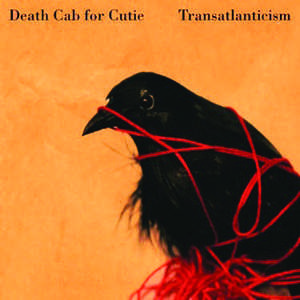
Even though this album was released in October of 2003, it’s worth revisiting. It was easily one of the top five albums of the year. Death Cab for Cutie in many ways, represented a new spin on Seattle indie rock. They fused the angst of distorted guitars with a soothing and more sensitive approach to songwriting and vocals. They took a page from second-generation, grunge artists like Built to Spill, Pavement and Sunny Day Real Estate and brought it to the mainstream with their fresh approach to narratives.
The accessibility came from Ben Gibbard’s motivations as a songwriter. If the term emo didn’t have such negative connotation surrounding it in terms of music, then it would be an apt expression because Death Cab For Cutie has an emotional approach like most music. Ben Gibbard writes about heartaches (like a lot of music), and that is especially true on this album. But even that states it too generally, because what he really sings about is the gap that separates us all as individuals. In the case of Transatlanticism, he sings about the distance between young, confused lovers.
This is young adult stuff in a specific sense, but in a broad sense it’s for anyone who has ever dealt with disappointment. The opening track, “The New Year,” is appropriate as the leaves begin to change and holiday plans materialize. With lyrics like, “So, this is the New Year, and I don’t feel any different,” it occupies the space between our expectations of the coming year and the relative monotony of the previous one.
It’s a dynamic album, and the locked in listener will experience a range of emotions facilitated by the instrumentation and lyrics. Something “Title and Registration” makes clear is that even the happy sounding songs on this recording are sad. This is a pretty popular song and it once again places the listener in an area of confused emotions. It wades through familiar territory for anyone who has experienced an emotional loss. Despite its mildly ridiculous concept (changing the name of the glove compartment), it offers insight into the phenomenon of how we forget our past relationships even with those that we may have deeply cared about.
Transatlanticism’s music starts out bubbly and upbeat, and while the songs don’t become any less pensive, the music slows in tempo. While slowing, it still sounds expansive and turbulent, and the distorted swell at the end of “Transatlanticism” gives the album the momentum it needs to make it through the piano led “Passenger Seat”. If tracks number two through seven present a widening gap between two people, then “Passenger Seat” is a nostalgic look at the beginning of a relationship, or perhaps the awkwardness of one in decline. Or more appropriately, a point when you both understand that things will not work out, but you’re holding on to a glimmer of what attracted you in the first place.
Once again the melody turns from bright and airy to driving and dark when “Death of an Interior Decorator,” gives way to, “We Looked Like Giants.” This song represents the regretful side of our memories and further elicits the complexities of them. The final track is stripped down and represents a clarity that comes in the final stages of any separation.
Transatlanticism is a great album on many levels. Even if this concept sounds far too sappy for you, the soundscapes alone warrant your attention. For a four piece band they sound really big, but not in a U2 sense. Their rhythm section is undeniably solid and they always offer an interesting approach to what could normally be boring. The fuzzed-out, mad guitars go a long way to temper their sentimentality. Any fan of good contemporary music would at least like them for this. This album creates the perfect soundtrack for the season. It sounds like late fall when even the warm days will fade as quickly as the sun into cold darkness. It sounds like changing leaves that fall to the ground and swirl with the wind. And best of all it doesn’t really sound like it’s ten years old, so give it a listen.








